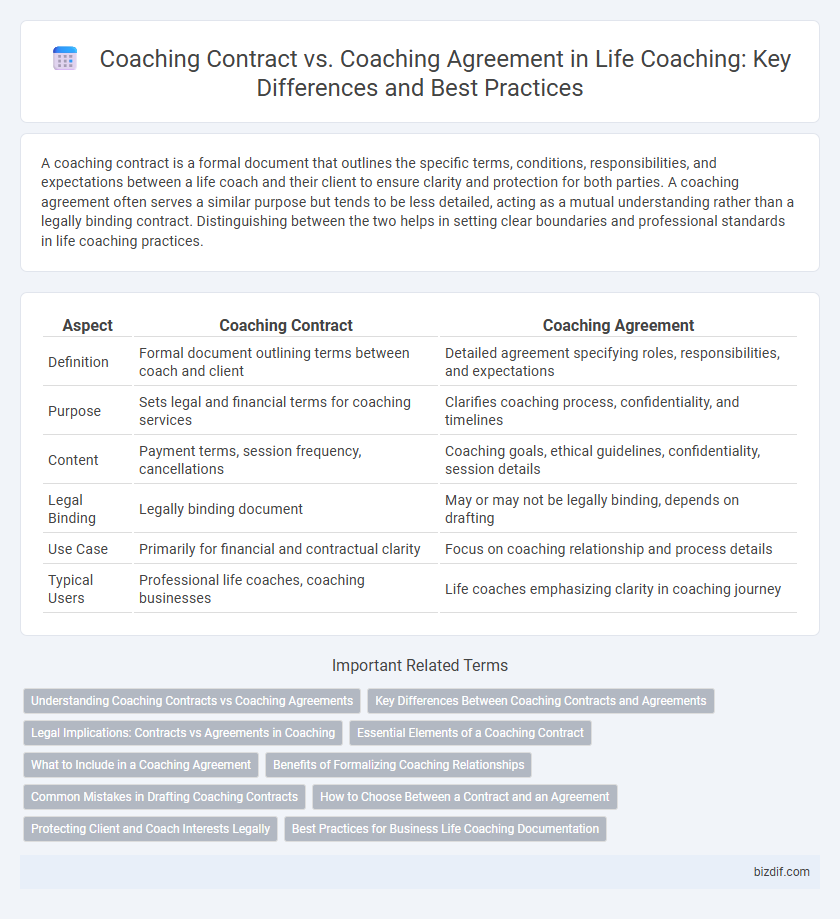A coaching contract is a formal document that outlines the specific terms, conditions, responsibilities, and expectations between a life coach and their client to ensure clarity and protection for both parties. A coaching agreement often serves a similar purpose but tends to be less detailed, acting as a mutual understanding rather than a legally binding contract. Distinguishing between the two helps in setting clear boundaries and professional standards in life coaching practices.
Table of Comparison
| Aspect | Coaching Contract | Coaching Agreement |
|---|---|---|
| Definition | Formal document outlining terms between coach and client | Detailed agreement specifying roles, responsibilities, and expectations |
| Purpose | Sets legal and financial terms for coaching services | Clarifies coaching process, confidentiality, and timelines |
| Content | Payment terms, session frequency, cancellations | Coaching goals, ethical guidelines, confidentiality, session details |
| Legal Binding | Legally binding document | May or may not be legally binding, depends on drafting |
| Use Case | Primarily for financial and contractual clarity | Focus on coaching relationship and process details |
| Typical Users | Professional life coaches, coaching businesses | Life coaches emphasizing clarity in coaching journey |
Understanding Coaching Contracts vs Coaching Agreements
A coaching contract outlines specific terms, responsibilities, and expectations between the coach and client, ensuring clarity on session frequency, fees, and confidentiality. Coaching agreements often serve as more flexible documents, emphasizing mutual commitment and collaboration without overly detailed legal language. Understanding these distinctions helps life coaches establish clear boundaries and protect both parties in professional engagements.
Key Differences Between Coaching Contracts and Agreements
Coaching contracts and coaching agreements both establish the terms of the coaching relationship but differ primarily in formality and specificity. Coaching contracts are legally binding documents that outline detailed obligations, payment terms, confidentiality, and dispute resolution, ensuring enforceability. Coaching agreements tend to be less formal, serving as mutual understandings or frameworks guiding the coaching process without strict legal obligations.
Legal Implications: Contracts vs Agreements in Coaching
Coaching contracts establish legally binding obligations between the coach and client, clearly defining scope, confidentiality, payment terms, and termination conditions to minimize legal risks. Coaching agreements, while often less formal, may lack enforceability if disputes arise, potentially exposing both parties to ambiguity regarding rights and responsibilities. Understanding the legal implications of contracts versus agreements is essential for protecting both coaches and clients in professional coaching relationships.
Essential Elements of a Coaching Contract
A coaching contract typically outlines the essential elements that structure the coaching relationship, including the scope of services, session frequency, payment terms, confidentiality clauses, and cancellation policies. This document ensures mutual understanding and sets clear expectations between coach and client, enhancing accountability and trust. A coaching agreement, while similar, often serves as a legally binding version with more detailed terms and conditions to protect both parties.
What to Include in a Coaching Agreement
A coaching agreement should clearly define the scope of services, session frequency, duration, fees, confidentiality terms, and cancellation policies to establish mutual expectations between coach and client. Including detailed objectives, boundaries, and responsibilities ensures commitment and accountability throughout the coaching relationship. Legal considerations such as dispute resolution and termination clauses safeguard both parties while fostering trust and professionalism.
Benefits of Formalizing Coaching Relationships
Formalizing coaching relationships through a coaching contract or coaching agreement ensures clear expectations, accountability, and mutual commitment between coach and client. These documents outline specific goals, confidentiality terms, and session logistics, enhancing trust and professionalism. Establishing a formal agreement minimizes misunderstandings and provides a structured framework for measuring progress and success in life coaching.
Common Mistakes in Drafting Coaching Contracts
Common mistakes in drafting coaching contracts include vague terms around session frequency, unclear payment schedules, and insufficient confidentiality clauses. Many coaches overlook specifying cancellation policies and the scope of services, leading to potential disputes. Ensuring precise language in coaching agreements prevents misunderstandings and fosters professional client relationships.
How to Choose Between a Contract and an Agreement
Choosing between a coaching contract and a coaching agreement depends on the level of formality and legal protection required; contracts are legally binding documents that outline specific terms, responsibilities, and consequences, offering stronger enforcement. Coaching agreements tend to be less formal, focusing on mutual understanding and scope of services without the rigid legal obligations, making them suitable for more flexible coaching relationships. Evaluate client needs, risk tolerance, and the complexity of the coaching engagement to determine whether a contract's authoritative framework or an agreement's informal clarity better supports professional coaching success.
Protecting Client and Coach Interests Legally
A coaching contract and a coaching agreement both serve to protect client and coach interests legally by clearly outlining the scope of services, confidentiality, payment terms, and termination clauses. A coaching contract typically provides a more formal and comprehensive legal framework, often including liability limitations and dispute resolution processes, whereas a coaching agreement may be less detailed but still establishes essential obligations and expectations. Ensuring these documents are tailored to the coaching relationship mitigates risks and fosters a transparent, professional partnership.
Best Practices for Business Life Coaching Documentation
Coaching contracts and coaching agreements both serve to establish clear expectations and responsibilities between life coaches and clients, but best practices emphasize using detailed, legally sound documents tailored to specific coaching methodologies and business goals. Effective business life coaching documentation includes explicit terms on confidentiality, session scheduling, fees, cancellation policies, and ethical standards to protect both parties and promote transparency. Clear, comprehensive contracts foster trust, mitigate disputes, and enhance the professionalism of life coaching services, thereby supporting sustainable client relationships and business growth.
Coaching contract vs Coaching agreement Infographic

 bizdif.com
bizdif.com